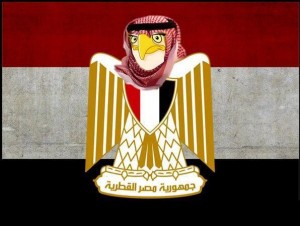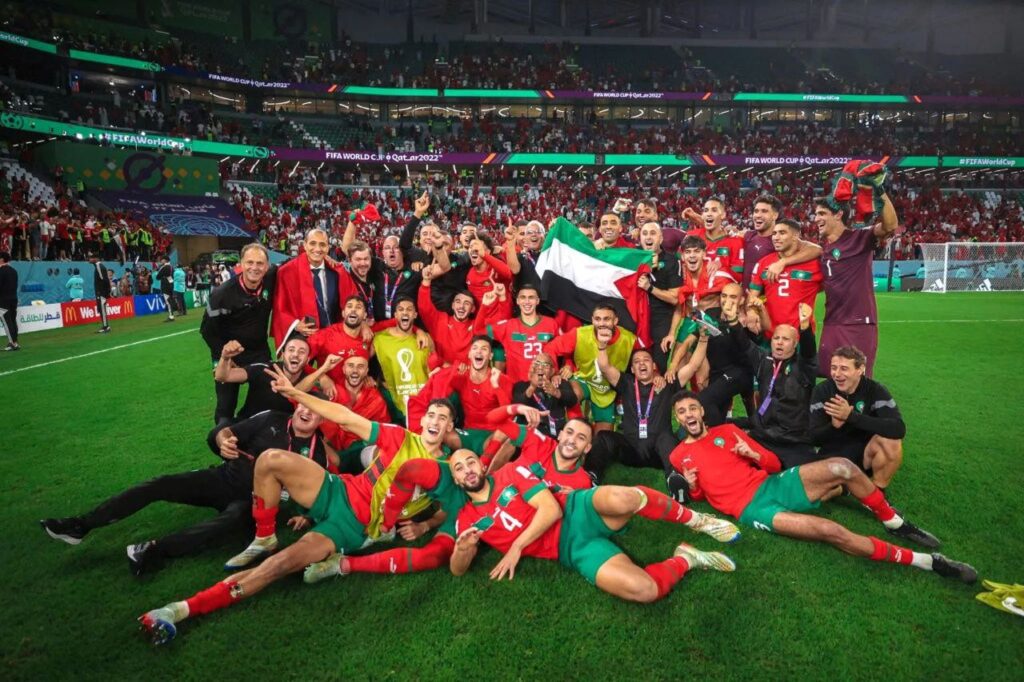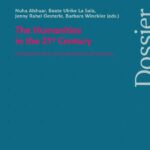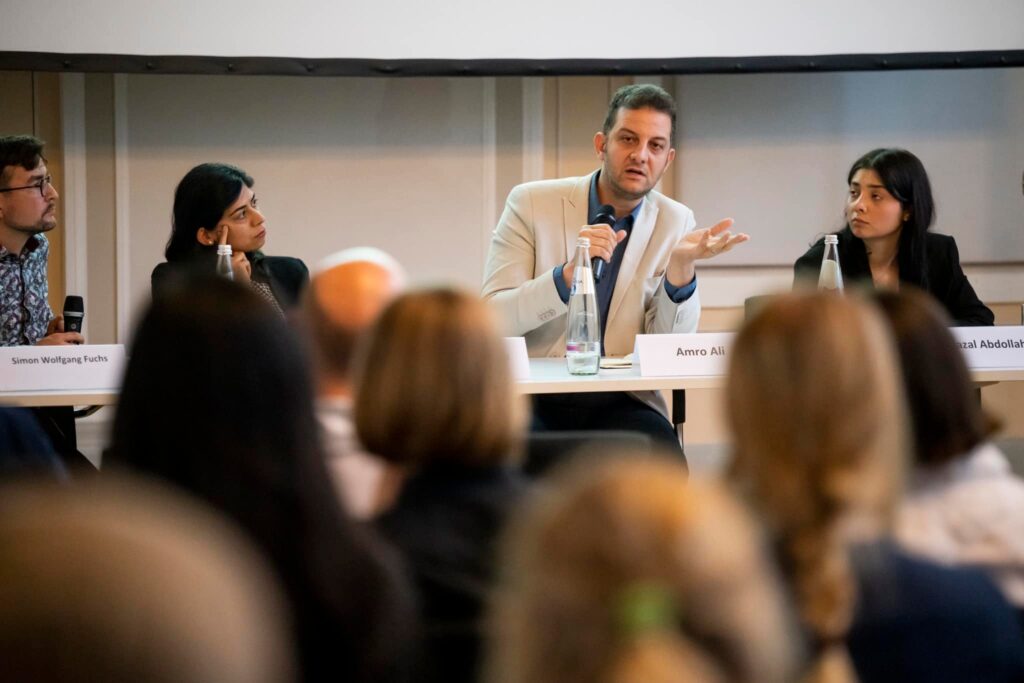Published in openDemocracy and Ahram Online
Upon his arrival at the Al-Jazeera studio in Doha, Egypt’s former president Hosni Mubarak quipped his shock at the small office space of the news giant: “All that noise from this little matchbox?”
That “noise” widened beyond the Doha studios to take in the peninsula’s foreign ministry and royal palaces, eventually drawing the ire of Egypt’s revolutionary forces as Qatar cozied up with their country’s Muslim Brotherhood.

The patronage role that Qatar plays to the region’s Islamists has been well covered by Arab affairs commentator Sultan Sooud Al Qassemi. Also As’ad AbuKhalil and others have given a deal of attention to the issue, which therefore will not be discussed here.
Qatar’s frequency on Egypt’s news and commentary radar has been reflected in everything from unconfirmed stories of Qatar buying the Suez Canal to frequent yarns about how much influence the tiny state is gaining in Egypt. A focus on Qatar and other Brotherhood patrons should continue to be scrutinized, but it risks enveloping the dynamics that started the revolutions.
As a student of international relations I would hesitate to downplay the role of state actors, but if the Arab uprisings have taught us anything, it is that the Arab public represents a formidable challenge to power elites. Grievances should not limit Egypt’s revolutionary camp towards a reactionary anger at Arab governments at the expense of a proactive outreach to Arab societies – the very element that two years ago fuelled a trans-national Arab uprising or at the very least, demands for reform. One party in particular that requires examination is the large number of the Arab world’s passive supporters of Egypt’s Brotherhood which is a byproduct, if not of a pro-Brotherhood slanted Al-Jazeera (Arabic) and other media outlets, at least partly to the incoherent noise Egypt’s revolutionaries have unintentionally exported.
To Arab outsiders, the revolutionary camp often looks like a ragtag bunch of hedonists and atheists who can never be satisfied with any sort of change. The extended Egyptian Revolution needs to acknowledge this external but critical constituency that provides the ideological underpinning of the Brotherhood’s international support. While it may not seem so dramatic, it reveals itself in everything from Arabic editorials to those calling into TV programmes.
It is not unusual to hear Arabs say they support Egypt’s Brotherhood because, “there is no other choice”, “they know God”, or “they are the best to eventually unite the Arab world.” (See my article Brothers in the Hood: Egypt’s Soft Powers and Arab World)
Some measures, an informal “foreign policy” of some sort, needs to be taken into account by the revolutionary camp to start beaming a compelling message to narrow the gap between the Arab world’s perception of Egypt’s Brotherhood and the reality on the streets of Cairo, Alexandria, Port Said and others.
First it will require empathy on Egypt’s part to see how Arab societies perceive Egypt’s role and the reasons why they might support the Brotherhood. It is not enough to take a condescending “none of your business” tone simply because they are at odds with a political position or lack an Egyptian identity. If intellectuals wish to push Egypt’s Om al dunya (mother of the world) role, then it has to accept some reciprocity in its relationships, just like “light-weight” Tunisia inspired (some would say shamed) Egypt into action. Egypt’s revolution did not happen in a vacuum and its struggles are surely interconnected with other Arab struggles with similar goals of bread, freedom and dignity.
Second, when I say Brotherhood supporters, I’m not talking about the types that would be swayed by a dispensation of vegetable oil and cooking gas, but by perceived ideological considerations for the wider Arab world. Arabs, disappointingly, do not see Egypt’s domestic concerns of unemployment, police brutality, corruption and so forth as important compared to Egypt’s role vis-à-vis the Arab world. However this perception still needs to be accommodated.
Third, it needs to be made clear that Egypt’s civil forces do not equate to an anti-religious element in any way. The revolutionary camp needs to be clearly defined as a plurality of views and identities that can coexist, including liberal Islamists. I have yet to witness revolutionary/liberal demonstrations where a large number of protestors did not stop and pray when the mosque’s call to prayer sounded. This is just the nature of Egyptian society, irrespective of political or religious affiliations. It is also important to note that the venerated Al-Azhar’s political positioning is closer to the revolutionary camp than it is to the Islamists. Yet many Arabs express surprise when they discover this.
Fourth, most critically, one should not fall into the Sharia trap by opposing it, to do so is to play the game of identity politics that has been deliberately set up so that only the Islamists can possibly benefit. Egypt’s struggle was never about Sharia as much as it was about anti-authoritarianism. As Khalil Al-Anani noted: “The Islamists are using Sharia to polarise opinion and control various aspects of public space. Proud of their ability to over-simplify Sharia through satellite broadcast, social networks, and other media outlets, the Islamists are turning Sharia into dogma.” Al-Alani argues that many have overlooked the fact that Sharia is a rich and pluralistic tradition of innovative ideas that historically was never imposed from above and in which the political and cultural concerns of any given time sensitively reflected the concerns of society. But a sophisticated reading of Islamic history and its nuances is too time-consuming for Islamists who in their theatrics have taken on Sharia as a “monolithic and abstract concept to wield like a baton against their opponents” as Al-Anani puts it. Sharia has been abused by Islamists much as Neo-Conservatives in the US once abused the word ‘democracy’ – hollowing out its meaning until it has become a despised buzzword.
Fifth, a common language needs to be utilised that invokes Quranic verses and Hadiths (traditions) regarding deceit, hypocrisy, even sexual harassment, to counter the Brotherhood’s platform that does exactly what it preaches against (or turns a blind eye too). A cursory examination reveals the revolutionaries carry out (without fanfare) the Islamic precepts of social justice, fighting corruption, and fulfilling the timeless wisdom of the Prophet, who stated: “The best Jihad is to speak a word of truth to a tyrant ruler.” This was something today’s stage-strutting Islamists could barely bring themselves to do against Mubarak when the time came for Egypt to rise up. The Brotherhood’s policies can be their own undoing, such as the backlash from the proposed IMF loan. Such instances provide us with an excellent opportunity to mirror the Pro-Brotherhood view of a world riven between the sacred and forbidden, by framing the anti-IMF loan to Arab populations in the latter category.
The lack of a counter-narrative keeps on reinforcing the Arab view that the Brotherhood might have to screw up in the short term in order to secure a “powerful Egypt” in the future. That there is no alternative. Yet as Sara Khorshid remarks: “Pro-Brotherhood Arabs need to realize that Egyptians are no longer ready to give a carte blanche to a ruler in the hope that he might prove to be good in the future.”
Finally, more compelling than any Morsi presidency or Brotherhood appeal is what Egypt will do for the Palestinians? This is the Lingua Franca of the post-colonial Arab world and supporting evidence has shown that even hardened Islamists will abandon their strongholds in favour of any figure or group that will take up the mantle of the Palestinian cause. We have seen this time and time again, with Islamists abandoning their anti-secular stances to support Saddam Hussein in the 1991 Gulf War, abandoning their Anti-Shiite stances to support Hezbollah during the 2006 Lebanon War, and even internally with Egypt’s own former presidential candidate and self-styled Pro-Palestinian Nasserist, Hamdeen Sabahi, swaying traditional Islamist constituencies into his secular orbit. This is not to suggest that populism should be courted and exploited – but to advocate responsible articulation of the Palestinian cause woven into a tolerant pan-Arab and pan-Islamic narrative with international law as its bedrock.
All the above does not discount the fact that Arab policy-makers will continue to pursue their realist interests and Qatar in particular will continue with its secret (and not so secret) backroom deals to prop up the Brotherhood, which in turn, will continue to make the Gulf state a lightning rod of Egypt’s revolutionary fury.
But the Egyptian revolution’s best allies will be found in the populations that it inspired and was inspired by that can enable Egypt’s revolutionary forces to, once again, push ideas and principles into the international system that will resonate with the Arab public, help shape the parameters of the debate and constrain the hands of elites and decision-makers. This is a result of what Marc Lynch notes in his book, The Arab Uprising: The Unfinished Revolutions of the New Middle East “The Arab political space…[brings] together all regional issues into a common narrative of a shared fate and struggle. This new Arab public sphere is highly critical of most ruling regimes, extremely pan-Arabist in its orientation, and self-consciously celebratory of the power of a long-denied Arab street.”
Egypt’s revolutionary groups are mired in internal divisions and the lack of a unified political force will stunt the development of a new narrative that it can potentially carry across into the Arab world. Yet it must be remembered that despite being in the service of states, soft power and cultural diplomacy are the reserve of civil society and it is as ancient as the Arab proverb that echoes “When you shoot an arrow of truth, dip its point in honey.” Egypt’s revolutionary camp has enough honey, it just needs the arrow and practice to shoot it effectively through the noise.






